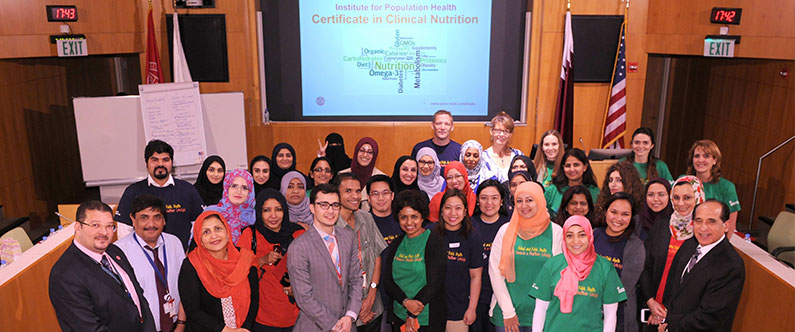WCM-Q nutrition course gaining momentum
 Dr. Ravinder Mamtani and Dr. Sohaila Cheema, far right, with some of the 55 participants who completed the 50-hour Certificate Clinical Nutrition course.
Dr. Ravinder Mamtani and Dr. Sohaila Cheema, far right, with some of the 55 participants who completed the 50-hour Certificate Clinical Nutrition course.
“The positive impact that just a few weeks of eating a good diet can have on health is extraordinary,” says Dr. Ravinder Mamtani, senior associate dean for population health and capacity building. “You feel more energetic, your skin looks clearer, your eyes look brighter and you may have lost a few pounds so you feel lighter on your feet.
“Now imagine those positive effects multiplied by months or years – the benefits to health are potentially enormous. Not only will you feel great but you dramatically reduce your risk of suffering a whole range of very serious health conditions. That is why we feel so strongly that good education about nutrition is one of the most important things that can be done to improve public health.”
This is the philosophy that motivated WCM-Q’s Institute for Population Health to create the Certificate for Clinical Nutrition, a comprehensive, intensive 50-hour course open to all healthcare professionals, educators, researchers and dieticians that provides enhanced knowledge of key issues relating to nutrition and health.
The course, which consists of 32 hours of direct, on-site contact at WCM-Q followed by 18 hours of online self-study, enables participants to gain in-depth knowledge of a wide variety of nutrition-related topics. These include the impact on health of popular nutritional and herbal supplements, elimination and anti-inflammation diets, Mediterranean diets, veganism and vegetarianism, the DASH diet (Dietary Approaches to Stop Hypertension), and the role of nutrition in the causation and management of chronic conditions such as obesity, cancer, heart disease, hypertension (high blood pressure) and diabetes. Non-communicable diseases (NCDs) such as these now pose the greatest risk to public health globally, and they are particularly prevalent in the Gulf region, including Qatar. Data from the World Health Organization reveals that an estimated 13 percent of people in Qatar have diabetes, 76 percent are overweight and 41 percent are obese.
Successfully launched in May 2016, the first Certificate for Clinical Nutrition course attracted 51 attendees from a variety of institutions across Qatar. Recently the course was offered a second time and drew 55 participants, with one coming from as far afield as London, England and another joining from Bahrain.
Dr. Mamtani said: “The increased prevalence of non-communicable diseases like obesity, diabetes and heart disease is extremely worrying and the medical profession has to respond swiftly to protect public health. We believe the best way to do this is to equip as many healthcare practitioners as possible with comprehensive knowledge about nutrition, based on the very best and latest research, which is what our Certificate of Clinical Nutrition is designed to do.”
The course gives detailed instructions on how to plan healthy nutrition regimens for all types of individuals, including children, adolescents, pregnant and lactating women, adults and the elderly. Attendees were drawn from many local institutions, including Qatar University, Aspetar, Sidra Medical and Research Center, Qatar Foundation, Hamad Medical Corporation and several private practices. All attendees who completed the course, which was held on four consecutive days, were awarded the Certificate in Clinical Nutrition.
Dr. Sohaila Cheema, director of the Institute for Population Health and assistant professor of healthcare policy and research, said: “We are very encouraged that so many healthcare professionals joined us and earned the Certificate in Clinical Nutrition. The medical profession has traditionally focused on treating disease rather than ensuring wellness and we are excited to be a part of the change towards a more balanced approach that uses enhanced knowledge of nutrition to help prevent people from becoming unwell in the first place.”